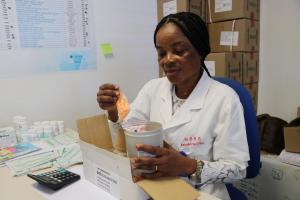Availability of antiretroviral treatment bolsters HIV/AIDS control in Equatorial Guinea
Malabo – In Equatorial Guinea, where over 6% of the population lives with HIV, access to antiretroviral (ARV) treatment was limited to just two centres in the provincial capitals of Malabo and Bata until 2017. This restricted access caused difficulties in patient follow-up and placed significant strain on health services.
“When I was diagnosed with HIV, it was a terrible shock. I felt like my life was falling apart,” recalls Jeanine, a woman in her forties. “I found it difficult to adhere to the treatment, which was not available nearby. I had to travel long distances to collect my medication in Malabo.”
With support from World Health Organization (WHO), a project to integrate HIV/AIDS services was launched in 2018, significantly expanding access to antiretroviral treatment across the country's 19 health districts. Over the next decade, treatment coverage tripled, reaching 49% by 2023, with a 3% increase between 2022 and 2023. During the same period, the prevalence of the disease decreased by 1%.
To enhance care for people living with HIV and address stigma, WHO supported the training of over 1,600 healthcare professionals in treatment protocols and psychological support between 2019 and 2024. Dr Manuel Eyene, a physician and regional coordinator for the control of STIs, HIV/AIDS, tuberculosis, and viral hepatitis at Bata Hospital, has participated in this training on several occasions.
“In medical school, I didn't receive training on how to follow up or fully manage an HIV-positive patient, but after various courses and training sessions organized by the programme, I was able to strengthen my skills in these areas,” says Dr Eyene. “Many things have improved both in terms of patient relations and observance of the various national treatment protocols.”
HIV diagnosis and prevention of mother-to-child transmission (PMTCT) services have significantly expanded across the country. Dr Eyene, who has been working at Bata Hospital for eight years, plays an active role in the PMTCT program. With antiretroviral (ARV) treatments now widely available, the proper management of HIV-positive pregnant women has helped reduce infections in newborns. “When an HIV-positive mother leaves the hospital with her uninfected child in her arms, I feel truly motivated. The availability of and adherence to antiretroviral treatment is delivering excellent results,” he adds.
Training across all levels of the healthcare system has been instrumental in changing the attitudes of healthcare staff toward stigma and improving the quality of care. Patients now receive clear and accurate information on the importance of treatment, which has significantly improved treatment adherence.
To ensure treatment adherence and prevent drug resistance, patients are closely monitored. They attend an initial check-up 14 days after starting treatment and then return every three months to collect their medication. Since 2018, all HIV-positive patients have been able to access treatment regardless of their viral load status.
Through the introduction of advanced diagnostic tools such as GeneXpert machines in all health districts, the HIV screening rate in Equatorial Guinea increased significantly, rising from 34% in 2020 to 87% in 2023. These efforts are part of the country's commitment to achieving the 95-95-95 targets by 2030.
The aim is to diagnose 95% of all HIV-positive people, provide antiretroviral (ARV) treatment to 95% of people living with HIV, and ensure an undetectable viral load for 95% of those on treatment. “We need to continue decentralizing HIV services to achieve these objectives,” emphasizes Joaquin Ipo Ebanga, Head of the HIV/AIDS Programme at the Ministry of Health. “Antiretroviral treatment is essential for preventing new infections, interrupting virus transmission, and ultimately eradicating HIV in our country.”
WHO is collaborating with the Ministry of Health to support strategies including the integrated management of TB/HIV co-infection, decentralization of treatment centres, and improved access to treatment. “ARVs play a crucial role in the fight against HIV/AIDS. Equatorial Guinea is making encouraging progress, which gives hope to people living with HIV/AIDS,” said Dr George Ameh, WHO Representative in Equatorial Guinea.
For the past two years, Jeanine has been diligently following her treatment and is now in good health. “Today, we are fortunate to have free and much more accessible antiretrovirals. It’s important to get tested and adhere to treatment if you test positive,” she advises. “HIV is no longer a death sentence.”
Communications Officer
Regional Office for Africa
Email: lawsonagbluluf [at] who.int (lawsonagbluluf[at]who[dot]int)
Communications Assistant
WHO Equatorial Guinea
Email: michav [at] who.int (michav[at]who[dot]int)



